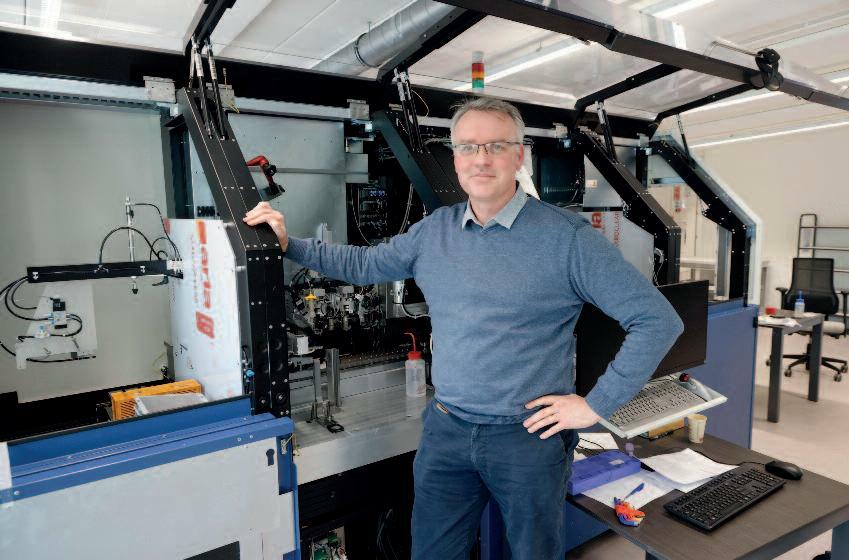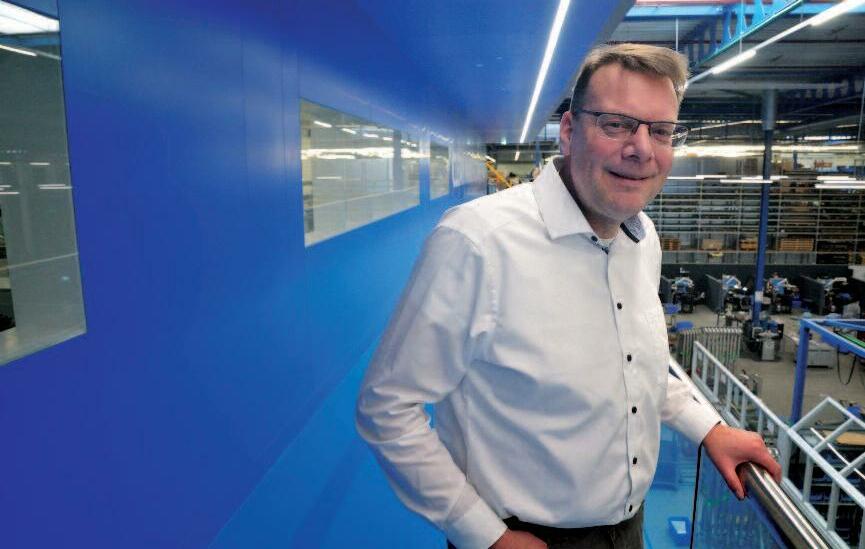SUPPLY-SECURITY
GROWING APPETITE FOR SILICON FORCES GERMAN AUTOMOTIVE TO TAKE CONTROL OF PRODUCTION
SUPPLIERS AT FOREFRONT OF EUROPEAN CATCH-UP OPERATION The global shortage of semiconductors has put the handbrake on car production in Germany. With trends like e-mobility and self-driving cars, the German appetite for silicon will only increase, so manufacturers want to take back control. The aim is for Germany to become the global centre for semiconductors. BY BERTUS BOUWMAN
S
ince the start of the pandemic, the production lines of Germany’s car industry have regularly been idle. This has mostly been caused by the global shortage of semiconductors – a problem that will not yet be resolved this year. On top of that, in the coming years the car industry will only need more microchips, argues Dutch chip machine manufacturer ASML in its ‘position paper’ on the EU Chips Act launched by the European Commission in February. The Veldhoven-based high-tech firm expects a radical shift driven by the move away from the internal combustion engine and the rise of self-driving systems. These trends have been on the horizon for a long time, but due to the shortage of chips the manufacturers have now discovered how vulnerable they are to geopolitical changes. The Chips Act is designed to bring a bigger share of semiconductor production to Europe in order to assure strategic autonomy. With a total of €43 billion in investments, Europe wants to increase its market share of the global chips industry from 9% to 20% by 2030.
COMPETING FOR CHIPS Like ASML, the German automotive sector expects global demand for chips to increase, so a survey reveals. Nearly every technical device contains semiconductor chips. That means cars have to compete with consumer electronics like TV sets, smart phones and fitness armbands. Modern cars no longer work without semiconductors. And in the coming years, driver assistance systems, infotainment and electrification of propulsion systems will mean even more chips will be needed. The development has taken place at lightning speed. Research by the German electronics and digital industry (ZVEI) has revealed that the average car built in 1998
contained microchips worth €120. In 2018, that value had The production line of the BMW-plant risen to €500, in München. Photo: Harry Zdera and by 2023 it is expected to be €600. For a supplier like Bosch, this has meant a doubling in the number of its chips in cars over the course of a few years. In 2016, each new vehicle built worldwide contained more than nine Bosch chips on average, for example in the airbag control system, the braking system and the parking assistant. By 2019, the figure had risen to over 17.
The global increase in demand for chips from the automotive sector was clear even before the pandemic. Nevertheless, car manufacturers were not prepared for the shortage. In early 2020, there didn’t appear to be a problem. The semiconductor industry was experiencing a strong economic upturn. But when the Covid-19 pandemic broke out, car sales briefly collapsed. Panicking, car makers cancelled their orders with large chip manufacturers. This proved to be a major miscalculation. When car sales revived, they found that the semiconductor industry had reserved their production capacity for manufacturers of consumer electronics. During lockdown, consumers ordered smartphones, tablets, laptops and games consoles on a massive scale in order to make the experience of being at home more pleasant. Leaving the car manufacturers out in the cold.
delivered because chips are missing. It therefore regularly delivers cars which are not fully equipped to customers at a discount. In practice, however, it is not always possible to upgrade later. The problems faced by Volkswagen in Wolfsburg are even more severe. There, night shifts for the production of the Golf model were cancelled in early 2022. One production line for the popular Tiguan is at a standstill. In 2021, VW produced 8.1% fewer cars than the year before due to the shortage of chips. For all brands of the VW Group, the figure was 4.5%. At a press conference late last year, CEO Herbert Diess put the figure for the number of cars they had been unable to deliver due to the shortages at 600,000. BMW, too, faced major problems and responded by significantly adjusting production programmes, explains spokesperson Sandra Schillmöller. Even so, in factories in Oxford and Regensburg that normally build nearly 1000 cars per day, production has sometimes had to be halted for several days at a time because components were missing. In certain cases, BMW has delivered new models without touchscreens for a lower price. BMW was eventually able to work away the backlog in the second half of 2021, says Schillmöller. ‘In fact, we are producing more vehicles than in 2019.’
INCOMPLETE CARS
GERMAN SUPPLIERS TAKE CONTROL
This is why Mercedes-Benz had to cut back production last summer, for example. Beside its factory in the south of Germany, there are car parks full of cars that cannot be
So German automotive needs to take control. Like all the other manufacturers, BMW does
MISCALCULATION BY CAR MANUFACTURERS
TO BE CONTINUED ON PAGE 29
Special High-tech The Netherlands - April 2022
27












